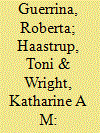|
|
|
Sort Order |
|
|
|
Items / Page
|
|
|
|
|
|
|
| Srl | Item |
| 1 |
ID:
193149


|
|
|
|
|
| Summary/Abstract |
Since 2014, several European Union (EU) member states have adopted their own versions of “Feminist Foreign Policy” (FFP). Increasingly, feminist bureaucrats, politicians, activists and scholars are calling for the EU to do the same. This article scrutinises claims to the feminist actorsness of the EU by introducing the analytical concept of Feminist Power Europe (FPE). In employing FPE the article examines whether the EU can adopt a FFP that upholds transformative potential of feminism. Undertaking critical content analysis of key documents, we identify three overarching feminist frames that emerge in the EU’s external policies: (1) Liberal; (2) Intersectional; (3) Postcolonial. We demonstrate that the EU’s propensity for a transformative feminist foreign policy is limited by the setup of global politics and the main drivers of European integration, which continue to be situated in a traditionally masculine environment and are defined by prevailing hierarchies. In undertaking this work, we highlight the constraints of advocating for the EU to adopt a FFP. This paper concludes by cautioning against the uncritical deployment of “feminism” in foreign policy articulation within an FPE configuration that excludes reflexivity about the EU’s external relations vision and indeed, its practice.
|
|
|
|
|
|
|
|
|
|
|
|
|
|
|
|
| 2 |
ID:
145275


|
|
|
|
|
| Summary/Abstract |
The European Union is seen to operate at the international level by promoting ideas and values, rather than by exerting military or economic power. As a gender actor, the EU has played a key role in the development of formal equality, which is presented as a foundational principle of European integration. It therefore follows that normative power Europe should seek to promote these values in external affairs. This article interrogates the role of the EU as a normative gender actor in relation to its implementation of the Women, Peace and Security (WPS) agenda, set out in UN Security Council Resolution 1325 and related resolutions. Documentary analysis will be supplemented by a detailed assessment of speeches and public statements about the role of the EU as a gender actor in external affairs. This data will be used to assess whether there is a disjuncture between the dominant narrative about gender equality as a fundamental value of the EU and the actions of the organization. It will also allow us to assess whether gender mainstreaming is a tool for public diplomacy or has made a significant change to the way the external relations agenda is formulated and implemented. Additionally, the article will draw attention to the institutional obstacles to the EU performing a role as a gender actor in external affairs. It identifies a critical tension between framing the WPS resolutions as an extension of the EU's equality on the one hand, and understanding that gender mainstreaming is a mere policy tool in international affairs. In doing so, it highlights how competing institutional demands can ultimately undermine core values (e.g. equality) when they are used instrumentally.
|
|
|
|
|
|
|
|
|
|
|
|
|
|
|
|
| 3 |
ID:
173744


|
|
|
|
|
| Summary/Abstract |
The EU has been a key actor in shaping European gender regimes in post-war Europe. There is a substantial amount of work on the role of the EU as a gender actor, particularly in employment and social policy. The adoption of and consistent referral to equality as a fundamental value of the EU raises important questions about the way the EU promotes ‘soft’ values in an international setting, through its security and defence policy, particularly as the EU is trying to promote itself as a normative actor. Hence, this article sets out to analyse where gender equality, as a policy frame, is located within the European External Action Service (EEAS). Through an investigation into whether the core normative principles of gender equality and mainstreaming have permeated this policy domain, we then focus on how the EEAS reflects the EU’s gender regime, which is informed by Walby’s framework, and how this shapes mainstream security and defence policies. We find that the neo-liberal foundations of the EU permeate the way the EEAS incorporates the principle of equality, leading to a shallow understanding that focuses on adding women into existing structures.
|
|
|
|
|
|
|
|
|
|
|
|
|
|
|
|
|
|
|
|
|